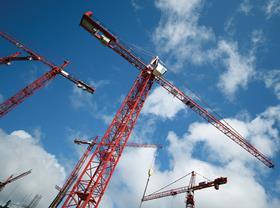PMI scores stayed remained unchanged from April

Firms catching up with weather-related disrputions from earlier this year meant workloads held up last month but orders for new construction work declined, new figures say.
The sector had a subdued May, with the soft growth conditions reported across the UK construction sector at the beginning of the year continuing into the second quarter.
The latest Markit/CIPS Construction PMI report revealed total business activity increased marginally during the latest survey period despite new work slipping back into decline.
Data showed the indexes score for May was 52.5 meaning the level of expansion remained unchanged from April.
Sam Teague, economist at IHS Markit, said: “The May PMI data signalled an unchanged pace of activity growth across the UK’s construction sector since April’s somewhat underwhelming rebound, yet nevertheless indicating a recovery in the second quarter after the contraction seen at the start of the year.
“However, activity in May was once again buoyed by some firms still catching up from disruptions caused by the unusually poor weather conditions in March and a renewed drop in new work hinted that the recovery could prove short-lived.
“Inflows of new business slipped back into decline, signalling the resumption of the downward trend in demand seen during the opening quarter. Companies frequently noted that Brexit uncertainty and fragile business confidence led clients to delay building decisions in May.”
Residential work remained the strongest sector for the third month running during May although the pace of expansion eased from April’s 11-month high, which had seen house building activity rebound from the heavy snow which affected sites in March.
Both the commercial and civil engineering sectors remained in growth territory for the second month running in May, with the former being the only category to record a faster rate of expansion than in April.
Scape chief executive Mark Robinson said the new orders decline was disappointing and argued that political inertia around infrastructure investment wasn’t helping matters.
“The expanding UK population is placing considerable pressure on our public services, and a lack of proper upkeep and investment will put a strain on local economies, as evidenced by Northern Rail over the past week. Spend on improved connectivity will unlock huge growth potential for our regions and for the UK economy as a whole.”
Robinson also took aim at the short supply of skilled labour. “The government must address the plummeting apprenticeship starts, and we need to think more creatively about how to incorporate apprentices into staffing structures, ensuring maximum benefit for the individuals and employers.”
Max Jones, global corporates relationship director for construction at Lloyds Bank Commercial Banking, said commercial activity remained an area of concern. “There is anecdotal evidence of some contractors seeking to retrench amid volatility in the market. Clients, meanwhile, are being more selective about who they appoint as contractors on key projects following events earlier in the year. Many would say this is no bad thing, though it may also slow down development.”
Blane Perrotton, managing director of the national property consultancy and surveyors Naismiths, added: “While the official output figures show the construction industry began the year in retreat, the PMI data reveals that on the front line, activity is holding up surprisingly well.
“There’s more than a dash of deja-vu to this latest report. The overall number of new orders has essentially flatlined since the start of the year as the Brexit merry-go-round cools investor appetite.”



























No comments yet